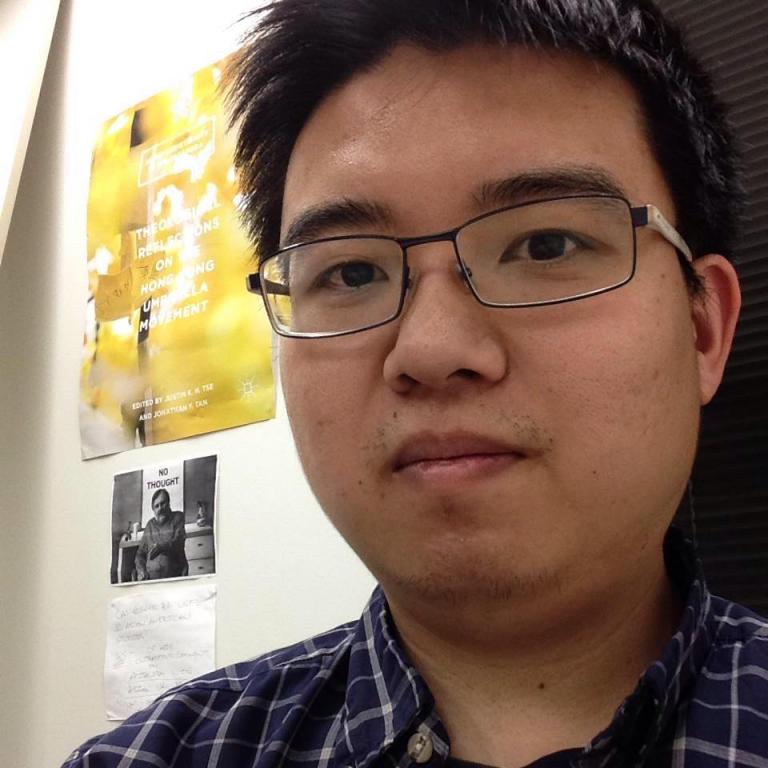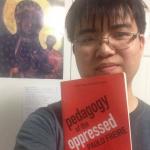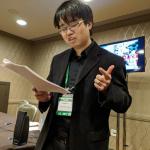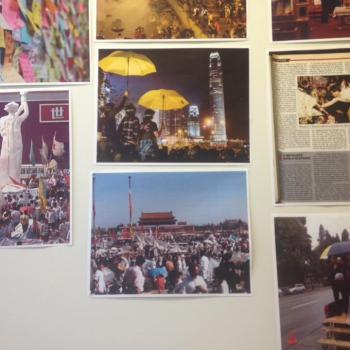
This is the fifth in a series reflecting on what I’ve been doing on the blog. The first, second, third, and fourth are here.
Properly speaking, I became interested in psychoanalysis because my research assistant is obsessed with it. I still remember him walking into my office after the third or fourth class session in Asian American history. He wanted to talk about Žižek; he had heard me mention him in class. I was curious about why an undergraduate freshman would be interested in psychoanalysis. It turns out that it was the only two reasons I thought was possible. The first was that he was taking a class on it, and I got confirmation on that soon when he began bringing in passages of Lacan to my office hours from his other class to see if I could make sense of them. The second reason was obvious: he wanted to talk about girls, and he thought that I, a straight Asian man who actually managed to get married, was the right person to talk to about it.
This kid also had a way of making grant money appear. One day in the middle of Spring Quarter 2017, when I was deep in the throes of that existential crisis over whether I was a jook sing or not, he announced that he had applied for a fellowship over the summer to study with me. It took me some time to clue in that he had basically offered himself as a sacrificial lamb as my research assistant, partly because he wanted to pursue his own questions through what I was curious about. I assigned him to my new Seattle case in my project on occupy movements, and I gave him free rein to read theory too and tell me about it. He spent most of his time on Žižek, though he also got into Fromm. By the time we were back in full throttle the next year, he told me that he wanted to read Freud in addition to digging through more of what we did over the summer on the theological afterlives of occupy movements in Seattle, and there was money for that too, and he had applied for it already. Good man, thought I, especially when we got the grant.
And so it was that when I got to the other side of my series on liberation theology and discovered that I was doing psychoanalysis – and that the analysis had to start with me – I also conveniently had a research assistant whose job was to curate an online archive on protests in Seattle on the one hand and to read Freud and Marcuse on the other to see if they were saying the same thing. This is the real reason that my blogging about Freud spiked in the opening winter months of 2018, especially as my second Great Fast drew near. Every Tuesday, my research assistant and I met at the local French coffee shop in Evanston and imbibed in memory of Freud, and as I got stronger, so did my writing on him.
Arriving at psychoanalysis through liberation theology’s emphasis on conscientization took me immediately back to Catholic school, where I had first learned about Freud and Jung. They started us early there, beginning by having us read Oedipus Rex and Joyce’s Dubliners in the freshman honors English class. We also learned about archetypes and mandalas in our freshman theology course. I learned much later on that what we were doing was basically an integration between psychoanalysis and Catholic theology, as the folks who taught the courses all seemed to have graduate degrees in a psychoanalytic approach to theological inquiry. Because of that, I had to see the kind of stuff that I was writing in high school, and when I dug out the literary magazine I had edited, I confirmed for myself that it was objectively terrible. My high school fantasies were so tainted by evangelical ideology that I winced more than once as I read through my old writing. Every other plot twist seemed to require a dramatic conversion. The characters were constantly in crisis. Come to think of it, that was also my modus operandi as an Asian American evangelical until I was weaned off my jook sing fantasy.
As far as I am concerned, Freud will always remain important for my doing of theology, not least because he has always been a significant background presence in my thinking. I remember that shortly after graduating high school and moving to Canada, I met an evangelical pastor who raised some serious objections to Freud’s secularism and obsession with sex. I wrote him a long email refuting his claims, arguing that perhaps Freud was onto something as far as original sin was concerned. I was still a Western Christian when I wrote that, so I own that that was my theology at the time. He replied with one line: Are you sure you are only eighteen?
My friends in the Kyivan Church in the Chicago Eparchy were delighted that I had come to embrace this side of who I truly was as a theological practitioner. I invited them over to bless my apartment, and not only did we have a priest who has studied psychoanalysis and practices in his own work (I hear a lot of confessions, he says), but they also brought a candle emblazoned with an icon of Freud calling him St Sigmund of Vienna with which to bless the house. This dear group of friends is now the circle that I facetiously refer to as the Kyivan Psychoanalysis Study Group, a play on the term Kyivan Church Study Group which had set out in the 1990s to study the possibility of double communion between the Greek-Catholic Church of Kyiv and the Ecumenical Patriarchate of Constantinople. They encourage me to keep probing the depths of my consciousness and to pay attention to my dreams as part of my practice of the Kyivan tradition. I blame them, really, for all of my cantoring dreams now.
As I look back now, these experiences resulted in a public record of a kind of conscientization for me. In liberation theology and psychology, the process of conscientization is the dialogical journey toward making one more conscious of one’s own consciousness, especially of the structures that have come to colonize it. I realized as I revisited my doctoral work on Cantonese Protestants – yet another false start in the process of revision – that if I was asking them about their imaginations of what civil society is, then it was not exactly fair for me not to reveal mine as well, including how I was still in process in imagining it too. I therefore began writing about that.
What became interesting to me as I wrote was that writing about myself didn’t end up being about myself. I started talking about my experience of transference in the academy, as well as my process of getting stuff out there into the public. Soon, I began to use a term that Sam had given me the summer before: breaking the mirror. Sam had told me that, for some reason, whenever I’d read anything or talk to anyone, I’d see them as a mirror for myself. What appeared to be a conversation with someone else would turn into a kind of mirroring process. But the weird thing that began to happen as I wrote these posts, alongside with beginning yet again to work on my book on Cantonese Protestants, was that I began to theorize that mirror. It wasn’t just psychoanalytical, in the sense of what Lacan took from Freud as the mirror stage, the part of childhood development when a child begins to recognize themselves in the mirror and therefore develops a sense of themselves. A mirror in this sense was my sense of self looping back on itself, and the culprit, I began learning from theorists like Byung-chul Han, could well have been the Internet, and social media specifically. I came to see the intellectual mistakes that I had made especially in Asian American evangelicalism in a new light. I had been stuck because I had learned the bad habit of taking on the world as my self. Conscientization is the process of differentiating those two things. In so doing, I broke the mirror. The world had to be the world, and I had to be me.
Tremendously empowered, I began writing through a number of ideologies that had influenced me since I was a kid. One day I wrote about neoconservatism and how deeply I secretly identify with the television show Scandal, and the next day I discussed my brief flirtation with the Democratic Party. Flitting about, I wrote about the Kyivan Church Study Group’s influence on my catechumenate in a post that was subsequently re-shared by the Religious Information Service of Ukraine (a proud moment in my blogging career indeed). I wrote about learning about church politics as a kid and talked about my journey of learning evangelicalism’s circuitous history through my own progressive learning about Billy Graham. I discussed icons in a post that earned me the attention of the American Academy of Religion’s Orthodox studies group.
And in the middle of that, I went home – not to Richmond, not in Evanston, but to Fremont, the city in the San Francisco Bay Area where I grew up. I stayed in my relatives’ house in San Francisco proper, in the Sunset. I was visiting my grandmother in her home, and along the way, I also had beers with my best friend in high school, as well as my very first student – from a Sunday school in Fremont. There was, I must say in psychoanalytic terms, a kind of catharsis. Suddenly, I was reminded that the ideologies of civil society that I was reflecting on had concrete form. I had not influenced in a vacuum. Speaking especially with the Sunday school student, I discovered that she understood the things I was talking about before I had to explain them because she had experienced the very same things as I did in the same church that played host to networks and influences by which the ideologies had come through. The only difference we had was an age gap, so while I was experiencing the neoconservatism and the evangelicalism and the intramural Chinese church politics and the flirtations with the American political system that I recalled in high school, she had gotten the same at full blast since she was a kid and did not have a Vancouver to escape to when she was in college. We had the same words to describe what we had experienced, the same ideas, the same networks, the same kinds of psychological problems. She understood what I meant by private consensus immediately, the irony that viewing the entire world as an archipelago of private institutions required a public sphere to generate that ideological imaginary. She had lived it. She had the same scars I did from it. She caught on to my mistakes with it. She comprehended its power. If this is not conscientization, I do not know what is.
I was stunned into silence in the quite literal sense that I did not know how to write. Certainly, the mirror was broken, but where did I go from there? Would I continue to write about psychoanalysis? Like my struggles with liberation theology and whether what I was doing was actually a theology of liberation, I asked myself whether this was still psychoanalysis or if it was something different. That was when my research assistant did something extraordinary. He arranged for me to have a conversation with the professor whose class on psychoanalysis he had taken and from whose readings he had questioned me during my office hours. He describes that meeting, in which he sat, as almost a Harry Potter kind of duel, a friendly spar, with magic coming out of intellectual wands. He had never seen that side of me before. He spent most of his time assisting me, which meant that he has seen me at my most incompetent. But here I was, competent, displaying my scholarly chops, connecting the work of psychoanalysis to the examination of the world beyond consciousness.
In that meeting, a big question of mine was answered. The query I came in to pose to my colleague was whether the stuff I was doing was actually psychoanalysis. He told me not only that it was, but that I had stumbled upon a concept that is seldom theorized in political psychoanalysis. It was as if, he said, I were speaking of the publics that constitute the world as a kind of transference, of engaging in them as if people were transferring their intimate situations onto a larger stage just as Freud discussed the situation where patients turn the analyst into their mommies and daddies. That was exactly it. For what Sam meant by the mirror when he accused me of seeing the world as one, Freud and Lacan had used transference. This is not the mirror stage indeed, when I am able to look at myself and develop a sense of who I am – that’s conscientization in Freirian terms. This is me turning the world into a hall of mirrors where I project my set of small-scale intimate encounters out onto a world that might not actually be constituted that way. That’s false consciousness. To get conscientized, you have to break the mirror.
I realize in hindsight now that my writing during this period was crucial for my intellectual breakthrough because there’s no way I could write about how Cantonese Protestants imagine and engage in publics without breaking my own mirror with them. Having a mirror with them is especially tempting because I am always tempted to see myself as a member of their community. Like my Sunday school student, I was raised in it. But in order to figure out how exactly we were raised and formed in our thinking, both of us have had to break the mirror.
And when I did, I began again to write about publics. To that we turn in the next post.












